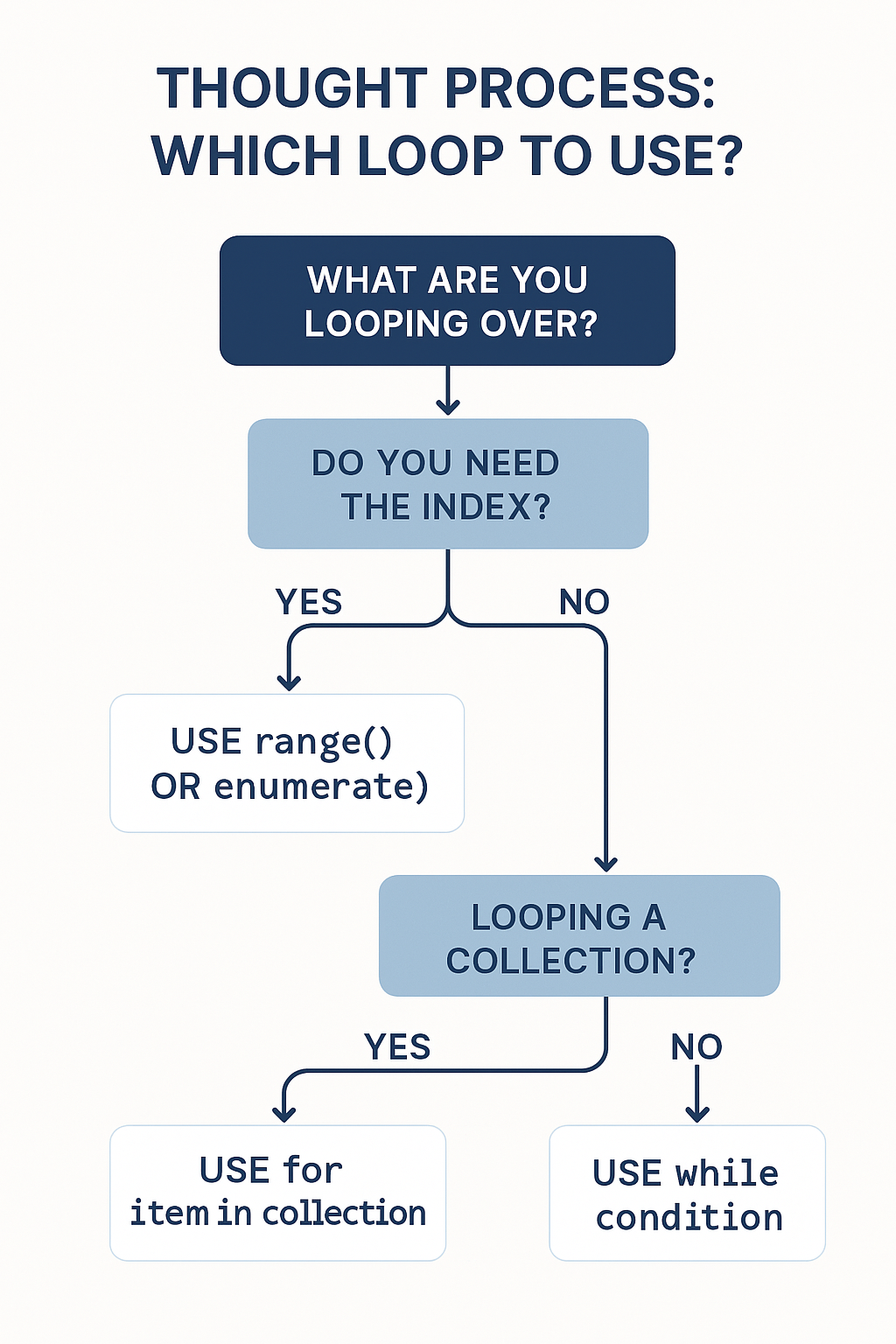Loops
🟢 Standard
Use when you want to loop directly over the items (values only).
| Input | Example | Output |
|---|---|---|
["apple", "banana"] |
for fruit in ["apple", "banana"]: print(fruit) |
apple banana |
"hi" |
for char in "hi": print(char) |
h i |
{ "a": 1, "b": 2 } |
for key in {"a": 1, "b": 2}: print(key) |
a b |
dict.items() |
for k, v in {"a": 1}.items(): print(k, v) |
a 1 |
🔷 RANGE LOOPS
Use when you need to count, index, or control the steps of iteration.
| Input | Example | Output |
|---|---|---|
range(3) |
for i in range(3): print(i) |
0 1 2 |
range(2, 5) |
for i in range(2, 5): print(i) |
2 3 4 |
range(0, 6, 2) |
for i in range(0, 6, 2): print(i) |
0 2 4 |
range(3, 0, -1) |
for i in range(3, 0, -1): print(i) |
3 2 1 |
range(len(list)) |
for i in range(len(fruits)): print(fruits[i]) |
values in fruits |
🟣 ENUMERATE LOOPS
Use when you want both index and value from a list or iterable.
| Input | Example | Output |
|---|---|---|
["x", "y"] |
for i, v in enumerate(["x", "y"]): print(i, v) |
0 x 1 y |
["a", "b", "c"] |
for i, letter in enumerate(["a", "b", "c"]): ... |
0 a 1 b 2 c |
🧱 NESTED LOOPS
| Loop Type | Input | Example | Output |
|---|---|---|---|
| 🔷 Range | range(2), range(2) |
for i in range(2): for j in range(2): print(i, j) |
0 0, 0 1, 1 0, 1 1 |
| 🔷 Range | 2D array (matrix) by index |
for i in range(len(matrix)):for j in range(len(matrix[0])): |
Access each matrix[i][j] |
| 🔷 Range | All pairs in list | for i in range(len(nums)):for j in range(i+1, len(nums)): |
Pairs (i, j) |
| 🟣 Enumerate | List of lists (2D grid) | for i, row in enumerate(grid):for j, val in enumerate(row): |
(i, j, val) per cell |
| 🟢 Normal | List of lists (values only) | for row in matrix:for val in row: print(val) |
Each cell value |
| 🟢 Normal | Two arrays (cross product) | for a in ["a", "b"]:for n in ["1", "2"]: print(a, n) |
a 1, a 2, b 1, b 2 |
1. ✅ Standard for loop
Use when you want to iterate over items in a list, set, or string.
colors = ['red', 'green', 'blue']
for color in colors:
print(color)
2. ✅ enumerate() loop
Use when you need both the index and the value.
for i, color in enumerate(colors):
print(i, color)
3. ✅ range() loop
Use when you want to:
-
Loop a specific number of times
-
Access list items by index
-
Do nested loops
4. ✅ while loop
Use when:
-
You don’t know how many times you’ll loop
-
You’re waiting for a condition to change
x = 0
while x < 5:
print(x)
x += 1
📌 Warning: Always make sure the condition will eventually become False or you'll get an infinite loop!
🧠 When to Use Which?
| Loop Type | When to Use |
|---|---|
for item in list |
Clean, readable, item-based loops |
enumerate() |
Index + value |
range() |
Loop by number or index, brute-force logic |
while |
Loop while a condition is true (uncertain end) |
Optional Daily Practice Prompts
Want to write one of each daily?
-
✅
for item in list: print all characters in "hello" -
✅
enumerate(): print index and item of a fruit list -
✅
range(): print numbers 1 to 10 -
✅
while: count down from 5 to 0
Want me to add this to your daily fundamentals checklist or export it as a mini Anki flashcard set or markdown file you can keep open?


No Comments